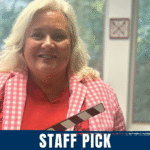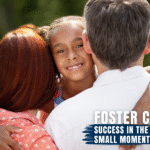Listen to Episode 18 of the Vigilant Voices™ podcast, YOU Can Be Part of the Village.
Kristin Blalock: Hello, listeners! Welcome to the Vigilant Voices podcast. We’re happy to have you with us because today we’re talking about that timeless saying, “it takes a village.”
Jeannine Panzera: And you, listener, are now part of our village. And so together we are taking time to know about the challenges facing children and families in order to ensure that no child faces additional abuse, neglect, or trauma. So today we wanted to kind of further explore this idea of it takes a village…
K: Because it is truth, I wouldn’t logistically get through the week without my village. Let alone all the big stuff that I rely on them for.
J: Absolutely. And when you think about the youth that we serve at Henrico CASA, the village is so incredibly important. Because the immediate family is not necessarily able to raise the children that we serve safely or without significant intervention, so these kids really need other people in their circles.
K: They do. And that makes me think of the young girl in today’s CASA case story. We’ll call her Taylor. But to put it really lightly, Taylor’s family bailed on her. Her parents had been gone her whole life. She was living with a relative long term, and a CASA advocate was assigned to her after she accused one of these relatives of abusing her. And during that process, her extended family kind of walked away from her, too. And so Taylor was truly alone, questioning her value, questioning her identity, questioning her future.
J: She needed a village.
K: Yeah, without a doubt. And since we’re talking about the village today, I’m going to link to a picture in our show notes that’s from the PACES Connection.
J: We’ve talked about that before. One of our favorites.
K: They are. And I just love this visual of the village because it reminds us that everyone can play a part. Churches, schools, coaches, neighbors, police officers, healthcare providers, community businesses, social services, and of course advocates.
J: Yeah, the list could go on. When I looked at this, what really stood out to me and reminded me, frankly, is that it’s not just individuals. It includes groups and organizations and businesses that are all part of this village.
K: Yeah, I noticed that too. And that’s what I was hoping we could chat about today, because sometimes it’s not clear how a group can get involved or make an impact. But there’s so many ways, and I think sometimes we just have to think a little outside of the box to see where there is a tie or a potential for collaboration.
J: So I am really glad that we’re talking about this now because we are heading into the holiday season, which time you know, this is also the time of year when a lot of people are thinking about giving back or maybe some New Year’s resolutions to get more involved.
K: Yeah. I think it’s natural this time of year to reflect on what’s important to us, to want to do things as an expression of gratitude for what we ourselves have.
J: Exactly. And every episode, we have left you listeners with a little call to action, something each and every individual who’s listening to us. And so now that I’m thinking about this and we’re chatting, Kristin, maybe today we instead focus on calls to action for different groups, and maybe that’s what we chat about today.
K: Yeah, that sounds great. And what I’m hoping we can offer to you listener are ways to support our work or efforts in the community that are ways to support without working directly with children.
J: Right. Because working with children, especially the children we work with that have been impacted by maltreatment in some way isn’t for the masses.
K: Right. It requires background checks and training time. And it’s not a fit for groups or businesses looking for kind of a one off volunteer opportunity, because what these kids need more than anything else is consistency and relationship, not someone kind of dropping in or out of their life.
J Right. But one of the best ways for our groups and businesses to support our work is oftentimes by supporting our higher level program needs.
K: That’s right. And something that immediately comes to mind as an idea is when groups host events like lunch ‘n learns. We love opportunities to raise awareness for not just our work, but just in general, the challenges facing families in the community. And I’ve found that in order for a person or group to even want to take a step to help, they kind of need to first understand the need that education.
J: Right. And so for us, specific to our work at CASA, I think that people don’t necessarily realize how, unfortunately, prevalent abuse and neglect really is all around us.
K: Yeah. There’s this mindset of, I know that happens, but not around here, not in my neighborhood. But that is not true.
J: That’s a myth. I think we did a myth buster episode. This is one of them. And just as an example, last year, 4038 children were brought to the attention of Henrico’s Child Protective Services Department. And then we served 359 children who needed an advocate just in our county alone in Henrico County.
K: Right. And out of curiosity, we actually mapped the data.
J: Oh, yeah. I remember that.
K: Yeah. And we serve children in every zip code of this county. So there’s no truth to the idea that, “oh, it’s not happening in my neighborhood.”
J: Right. And I have to point out, too, that Henrico CASA, we served the most families and had the highest number of new cases assigned to us out of all of the 27 CASA programs in the Commonwealth.
K: The need is undeniable. And that’s why something like hosting a lunch ‘n learn can be so helpful.
J: Right. Or inviting us to speak places like community organizations. I think, Kristin, you’ve done that with churches for Stand Sunday. It’s just a really effective way to reach people, to recruit advocates, just know, educate on our mission and what we do.
K: Sure. And it allows us to raise awareness by sharing stories beyond just the quick stats that we give you on the podcast. We can really talk through struggles that families are facing and then follow that up with information on how we at CASA are serving these families, but how you can also serve these families and how we can all together work towards the day when we can say, every child has a safe home.
J: Close our doors! That’s the goal in the nonprofit world for those of us that work with vulnerable populations. And so then what I love is that when we have these opportunities, this always leads to then conversation about people asking how they can help. And then what that does is that opens the door for us to share more about our advocate roles. And our ambassadors, which hopefully we can chat about a little bit, too. We have to remember that there’s just no shortage of ways to support children and families, whether that is a big way or just the little small things that we can do day to day.
K: Sure, sure. And in that umbrella of big ways, I would point out the actual role of being a COURT APPOINTED SPECIAL ADVOCATE. We talk about it often in this podcast. It’s the focus of our work. But at Henrico CASA, we recruit, we screen, we train, and then we supervise these skilled volunteers to advocate for a child who’s assigned to them.
J: Right. And what that means is that they visit consistently with the child. They collect information like school records, maybe talk to the child’s therapist or counselor, and we’re gathering information. We’re then conveying our observations, and we’re making recommendations for services. But that information is presented to a judge to help that judge make well informed decisions for these kids cases.
K: Yeah, it’s such an important role, but to have that level of influence and direct interaction with a child, you definitely need a lot of training. And so we created a second volunteer role for people who have a heart for this mission, but maybe can’t undertake that level of commitment that being an advocate requires. And so we call these people our AMBASSADORS…
J: Who we love! And in some ways, I liken this to our unofficial young professionals. They help us with various projects and campaigns all throughout the year. It’s a year long commitment. And then we have monthly meetings and check ins. I think it’s a fantastic way to learn more about our work, support our recruitment, and then fundraising and friend raising efforts.
K: And so, all this being said, when a group invites us to speak, there’s a lot to talk about. It’s the challenges facing families the needs of child victims and then opportunities like being an advocate or an ambassador to respond to these needs.
J: As we’re talking here, I’m thinking about our really amazing and very moving animation that we often play when we go and visit these different organizations.
K: I love our animation, maybe especially because it includes a CASA crayon box. But it clearly demonstrates how it’s never too late to help a child get on a different path.
J: So hopefully while we’ve been chatting, we’ve made a case that by hosting a speaking engagement, you’re helping to raise the communities, let’s just call it IQ, around child well being and some of the issues that our children and families face.
K: Yeah, but I also like when groups get involved to help with just one time needs that we might have. Like they might offer to work at an event or do office tasks for us.
J: Yeah, we’ve had businesses with very prominent storefronts host pinwheel gardens during April’s Child Abuse Prevention Month, for example, to illustrate the need of the kids that we serve.
K: Yeah, we had an employee group come in recently to assemble all of our training materials for a new training class. It was such a help.
J: So fantastic. And so then in addition to volunteering to help with various needs or events, we also have opportunities to then sponsor events we specifically love and host our annual Home for Good Playhouse event that we have every spring. And we’ve found that it’s a really nice win-win when companies financially support us through sponsorship, but then they get their recognition of that sponsorship. And the reality is that people love supporting businesses that are also doing good in the community.
K: Yeah, they totally do. And one more thing I’ll throw out there in terms of financial support is that Giving Tuesday is coming up.
J: Yeah. And I guess that’s what, November 28, right?
K: Yes. And, listener, I’m going to guess that you already know about Giving Tuesday. But just in case, it’s a global generosity movement. It’s a day where we are all encouraged to give in support of the causes that are important to us
J: and it purposely follows after Thanksgiving to remind us, “now let me give back.” But it really is a day where every dollar matters because the small donations, they really do have a ripple effect and add up to make a really big difference.
K: Oh, they do. And if you’re not following us on social media yet, please do. That way you won’t miss out on all the feels associated with Giving Tuesday.
J: Exactly, the good stuff. All right, so let’s see what we’ve talked about. So it takes a village, and that village, as we know, includes businesses and organizations that are very important to us, just like our amazing individuals.
K: Right.
J: So think about hosting a speaking engagement or information session, offer to support some of the one time needs that we talked about. Sponsor an event. Join our Giving Tuesday efforts. Become an advocate, maybe an ambassador, if it’s the right time for you.
K: And if you’re an employee of one of these businesses, find out what they would do to support YOU. There are employers who match financial gifts. There are some who match your volunteer hours with donations, and you may very well be able to get paid time off for volunteer hours. That’s a really common benefit these days.
J: Yeah. And it’s probably an underused benefit. So I would really love to see everyone start maxing out their volunteer time that their employers probably generously.
K: And so, back to our CASA case. Taylor’s CASA advocate, didn’t have to max out her time off because she was already retired. But no matter. She did a fantastic job getting to know Taylor and connected her with supports to move forward. She connected Taylor with a therapist who went above and beyond coordinating resources at the school. Taylor was also connected with a church that encouraged her and offered her creative outlets, like getting involved in the choir. But another example of Taylor’s village was BACA,
J: that stands for Bikers Against Child Abuse.
K: You know, it’s really difficult to testify when you’ve been the victim to some sort of abuse. And they literally showed up for her at court the day that she needed to testify against her abuser. They kind of circled around her, barricading her from seeing her abuser in the lobby, which is so scary. And it was just a nice picture of a group protecting a child.
J: I think it’s an image of their mission: to create a safer environment for abused children. If you look on their website, you know, BACA exists as a body of bikers to empower children, to not feel afraid of the world in which they live.
K: Yeah. So, Listener, that makes me, like, what groups or organizations or employers are you connected to? How could you help connect that group with a mission?
J: Yeah. And, I mean, I think if we do that, think about all of the good that we could do on an even larger scale. Yeah. So, your call to ation today listener, is to participate in Giving Tuesday on November 28. Just as a small gesture – $1, $5, $25 – to show that you are part of this village.
K: Definitely give wherever your heart is.
J: Yeah. Be a drop in what could be that huge tidal wave of generosity, because we are all part of the same village.







